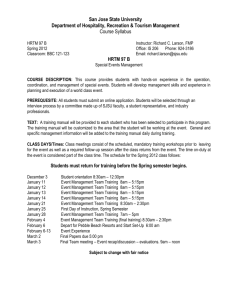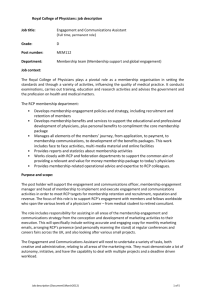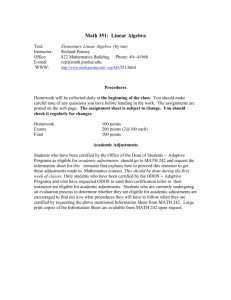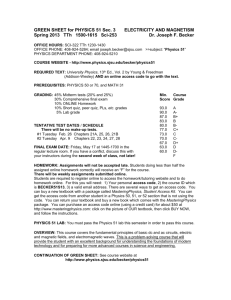JS - San Jose State University
advertisement
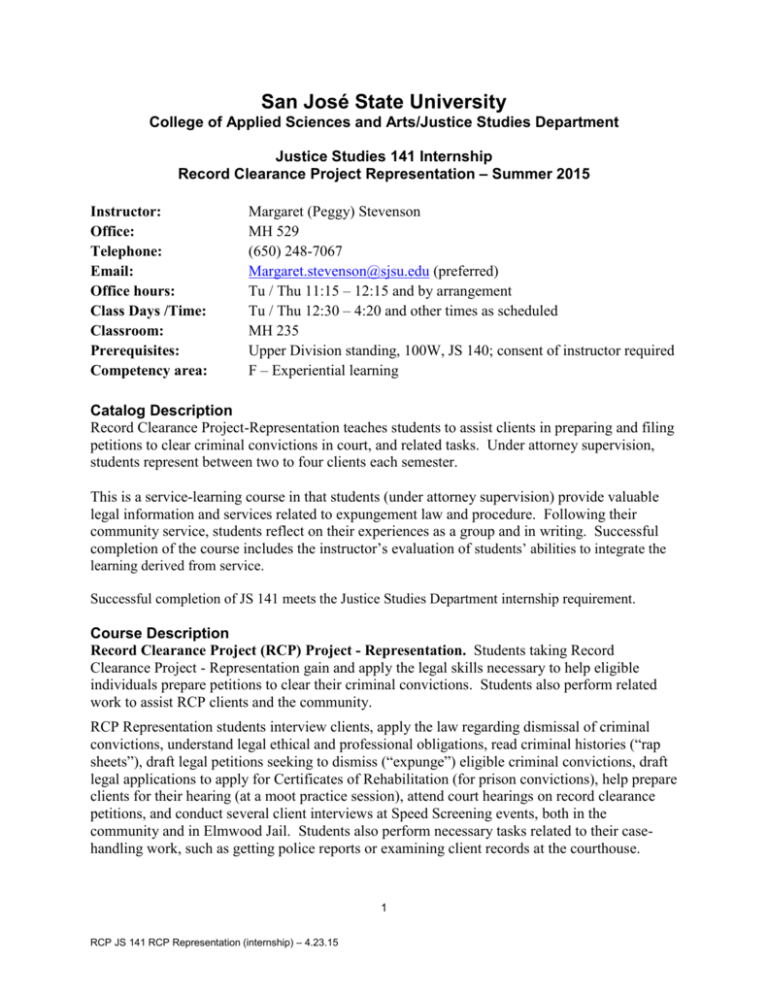
San José State University College of Applied Sciences and Arts/Justice Studies Department Justice Studies 141 Internship Record Clearance Project Representation – Summer 2015 Instructor: Office: Telephone: Email: Office hours: Class Days /Time: Classroom: Prerequisites: Competency area: Margaret (Peggy) Stevenson MH 529 (650) 248-7067 Margaret.stevenson@sjsu.edu (preferred) Tu / Thu 11:15 – 12:15 and by arrangement Tu / Thu 12:30 – 4:20 and other times as scheduled MH 235 Upper Division standing, 100W, JS 140; consent of instructor required F – Experiential learning Catalog Description Record Clearance Project-Representation teaches students to assist clients in preparing and filing petitions to clear criminal convictions in court, and related tasks. Under attorney supervision, students represent between two to four clients each semester. This is a service-learning course in that students (under attorney supervision) provide valuable legal information and services related to expungement law and procedure. Following their community service, students reflect on their experiences as a group and in writing. Successful completion of the course includes the instructor’s evaluation of students’ abilities to integrate the learning derived from service. Successful completion of JS 141 meets the Justice Studies Department internship requirement. Course Description Record Clearance Project (RCP) Project - Representation. Students taking Record Clearance Project - Representation gain and apply the legal skills necessary to help eligible individuals prepare petitions to clear their criminal convictions. Students also perform related work to assist RCP clients and the community. RCP Representation students interview clients, apply the law regarding dismissal of criminal convictions, understand legal ethical and professional obligations, read criminal histories (“rap sheets”), draft legal petitions seeking to dismiss (“expunge”) eligible criminal convictions, draft legal applications to apply for Certificates of Rehabilitation (for prison convictions), help prepare clients for their hearing (at a moot practice session), attend court hearings on record clearance petitions, and conduct several client interviews at Speed Screening events, both in the community and in Elmwood Jail. Students also perform necessary tasks related to their casehandling work, such as getting police reports or examining client records at the courthouse. 1 RCP JS 141 RCP Representation (internship) – 4.23.15 In case reviews, students discuss issues they have encountered in case-handling and discuss aspects of RCP practice. They help train JS 140 students by helping with class, planning and running workshops and mentoring new advocates. JS 141 students also help lead de-briefing sessions on Speed Screenings and court hearings in JS 140 class sessions. Course Goals and Learning Outcomes By the end of the course, students should have gained skills, experience and insight regarding the justice system, those involved in it, and some of the ways in which processes might be improved. They will have seen directly how, through their involvement and the application of their knowledge and training, they are able to use the law to assist others in often life-changing ways. Specifically, students have the following course learning outcomes (CLOs), as measured by the assignments noted (assignments described more fully in section below): 1. Practice and develop legal interviewing and counseling skills involved in legal work. 2. Apply ethical and professional obligations involved in legal work to real clients’ situations. 3. Prepare legal paperwork for court, apply facts to the law, and use advocacy in presenting material to the court. 4. Learn how the adversary system functions (in part), how to prepare clients for a court appearance, how a judge deliberates, how the parties – including judge, attorneys, probation department, court clerks and sheriff’s deputy (bailiff) – perform their roles in a court hearing. 5. Develop basic legal skills learned in a prerequisite course by helping teach basic skills to others. Required Texts/Readings The course reader from JS 140 will remain useful. Updated documents will be posted on the course website. There is no textbook. Textbook Other Readings Training materials and other required readings are posted on the course Canvas website. Course materials including the syllabus, readings, class notes, sample documents, resources and other materials are found on the course website on SJSU’s Canvas. Course website Course Requirements and Assignments In order to receive credit for JS 141 and meet the Justice Studies internship requirements, students must complete a minimum of 120 hours of RCP-related work. Timeliness and communication. Because real people with real legal cases are involved, it is crucial that students keep in close touch with their case-handling partners and me. Because the court has filing deadlines to have our petitions heard, our work is compressed into the weeks before the filing deadline. It is critical for students to keep up with the schedule so that we 2 RCP JS 141 RCP Representation (internship) – 4.23.15 are able to file quality, accurate and compelling petitions on time. Thus it may be very hard to make up any work missed, with the consequence being no credit for the course. Check the course website frequently for updates. Check your sjsu.edu email daily and respond promptly to notes to you from supervising attorneys and me. Please provide a phone number where we can reach you regarding case-handling. Please let me know if you will be out of town during the time we are preparing our cases for court. Time-keeping. Timesheets are due weekly. Turn them in to Nicholas Khanssari, RCP Database Manager, at nicholas.khanssari@sjsu.edu every Monday detailing the hours for the previous week. All hours spent on RCP work count toward the 120-hour requirement, except hours coming to and from regularly scheduled classes. Record your time in minutes on the timesheet provided on the class website. Provide sufficient detail so that how you spend your time is clear. For example, list whether you spent time interviewing your client, drafting the declaration, running a workshop, etc. Be aware that most of the work for the semester is completed before the last month, and gauge your progress accordingly. Providing timely, accurate timesheets is a course requirement. Keep track of your totals so that you can make sure to complete the 120-hour requirement during the semester. There is ALWAYS more work to do – just ask for it! You are welcome to attend any of the JS 140 sessions even if you are not scheduled to participate, since as you know from JS 140, various perspectives are welcome and helpful. If you attend, please contribute, even without being called on. Professionalism and direct client assistance. Professionalism is required in all RCP work. RCP Representation (JS 141) students help eligible individuals prepare petitions to clear their criminal convictions. Students work in teams, assisting several clients during the semester. Students are responsible for interviewing their clients, drafting the petitions for their clients, preparing their clients for their hearings, and performing related tasks. Before you meet your client, give me at least two days to review documents that you intend to discuss with your client. Please advise me of the date of the client’s upcoming visit so we are aware of timelines. By giving me sufficient time to review the documents, I can provide the feedback, raise the questions and identify the issues that you need to address in your client meeting. This is efficient and saves everyone time. Do not give your clients any documents you prepare until I have reviewed and approved them. You can and should go over draft language from the Declaration with them, but do not give them a copy to review until I have okayed it. This usually happens toward the end of the client meeting process. Both students of the two-student team should be present at the interviews, including substantive phone interviews. This is so that knowledge of the client’s case is with more than one person. Be sure if you meet with a client off-campus, that it is a private setting (to preserve confidentiality) in a public place (e.g., not at the client’s home). You can reserve a room at the ML King Library. Refer to the “Helping Clients Clear Criminal Records” and other course materials for further information regarding client meetings and professionalism. 3 RCP JS 141 RCP Representation (internship) – 4.23.15 Use only your sjsu.edu email account for class. This is because of internal email protections for transmitting confidential information. Based on your involvement in JS 140, you are aware of the professionalism and other requirements for RCP court sessions and Speed Screenings. Case reviews. In several class sessions, we will discuss issues that come up in our cases at case review. This could be in terms of client relationship, or how to deal with a difficult issue, a legal issue, or any interesting, challenging or other problem of potential educational benefit and interest to others. Papers. There are two papers required. One paper is the internship research paper. This paper should meet the requirements for the JS 181 paper described in the JS 181 internship syllabus posted on the Justice Studies Department website. http://www.sjsu.edu/justicestudies/for-students/internships/currentinterns/JS%20181%20SYLLABUS%20FALL%202014%20v2.pdf Even if you are not a Justice Studies major, please complete the research paper according to these guidelines. The due date and requirements are on the JS 181 website, though the paper is turned in to me. The current website states that “The … paper [is] due on the Monday prior to the last day of instruction (before final exam week), unless you have made other arrangements with your assigned JS 181 instructor.” Students are responsible for observing due dates and confirming due dates. The second paper is a case-handling paper of at least four pages. It should discuss some aspect(s) of your experience over the semester working with clients. Among issues that you might want to analyze are: How did your experiences with different clients compare? What went well in your case-handling? What could be improved? Did your training adequately prepare you for your work? Describe. How did your work in preparing your client’s(s’) case(s) affect your client’s(s’) experience in court? See the Tentative Course Calendar, following, for due date. University policy in general states the following: SJSU classes are designed such that in order to be successful, it is expected that students will spend a minimum of forty-five hours for each unit of credit (normally three hours per unit per week), including preparing for class, participating in course activities, completing assignments, and so on. More details about student workload can be found in University Policy S12-3 at http://www.sjsu.edu/senate/docs/S12-3.pdf. NOTE that University policy F69-24, “Students should attend all meetings of their classes, not only because they are responsible for material discussed therein, but because active participation is frequently essential to insure maximum benefit for all members of the class. Attendance per se shall not be used as a criterion for grading.” Grading Policy 4 RCP JS 141 RCP Representation (internship) – 4.23.15 Grading is based on credit / no credit basis. Successful and timely completion and compliance with the Course Requirements and Assignments outlined above are required to receive credit for the course. Because of the involvement of real people, it is possible that you may complete work for the class, but if you are asked to leave for breaching professional standards, you will not receive credit for the class. See below. Classroom Protocol Professional standards. RCP Representation students are expected to perform to the highest professional standards, thereby maintaining the reputation of the SJSU RCP for outstanding professional work. To do so, students need to attend all regularly scheduled classes; complete reading assignments; participate in training; prepare court papers to request that an individual’s criminal conviction be dismissed, observing all ethical and legal rules; assist in providing workshop sessions for extra practice for JS 140 students; present information to a community group regarding record clearances if needed; represent the Record Clearance Project and SJSU professionally in all interactions; and write two final papers in APA format. This class involves professional interaction with real people – and attendant significant responsibilities. If you do not consistently meet the serious and important course requirements that assure the ethically required legal competence and professionalism, you will be asked to leave the class. If this happens, you will not receive credit for any work you may have performed up to that point. Since this may happen at any time in the semester, it is particularly imperative in this class that students meet requirements and understand the heightened risk of not receiving credit for work done that is involved in RCP Representation. Please consider this seriously, particularly if you intend to use this class to meet an upcoming graduation requirement. By enrolling, you understand and accept the risk that you may not receive credit if you do not meet requirements of substantive knowledge, ethics and professionalism for JS 141. Failure to read this information does not constitute an excuse for lack of awareness of this policy. Scheduling. Some RCP activities such as workshops, Speed Screenings and court are scheduled beyond regular class hours. Students are asked to endeavor to attend the extra hours. We will try to arrange sessions according to student schedules (in coordination with my schedule to enable supervision); your flexibility is appreciated. Please check with me if you experience or anticipate any problems or issues regarding class. Since problems are best dealt with early on, getting in touch sooner rather than later is best. Do not start a case that you cannot finish if it means that a client will need to be reinterviewed. We cannot put a client through a second, duplicative interview just because you have completed the required 120 hours, so you need to be aware of what you can accomplish. Working 120 hours on RCP cases is required, but simply meeting the required time does not mean that you have satisfied your obligations for this class. For ongoing cases, we will determine a point at which you can turn over the case to the next student team without unduly inconveniencing our clients. 5 RCP JS 141 RCP Representation (internship) – 4.23.15 University Policies Dropping and Adding Students are responsible for understanding the policies and procedures about add/drop, grade forgiveness, etc. Refer to the current semester’s Catalog Policies section at http://info.sjsu.edu/static/catalog/policies.html. Add/drop deadlines can be found on the current academic year calendars document on the Academic Calendars webpage at http://www.sjsu.edu/provost/services/academic_calendars/. The Late Drop Policy is available at http://www.sjsu.edu/aars/policies/latedrops/policy/. Students should be aware of the current deadlines and penalties for dropping classes. Information about the latest changes and news is available at the Advising Hub at http://www.sjsu.edu/advising/. Consent for Recording of Class and Public Sharing of Instructor Material University Policy S12-7, http://www.sjsu.edu/senate/docs/S12-7.pdf, requires students to obtain instructor’s permission to record the course. “Common courtesy and professional behavior dictate that you notify someone when you are recording him/her. You must obtain the instructor’s permission to make audio or video recordings in this class. Such permission allows the recordings to be used for your private, study purposes only. The recordings are the intellectual property of the instructor; you have not been given any rights to reproduce or distribute the material.” o It is suggested that the greensheet include the instructor’s process for granting permission, whether in writing or orally and whether for the whole semester or on a class by class basis. o In classes where active participation of students or guests may be on the recording, permission of those students or guests should be obtained as well. “Course material developed by the instructor is the intellectual property of the instructor and cannot be shared publicly without his/her approval. You may not publicly share or upload instructor generated material for this course such as exam questions, lecture notes, or homework solutions without instructor consent.” Academic integrity Your commitment as a student to learning is evidenced by your enrollment at San Jose State University. The University Academic Integrity Policy S07-2 at http://www.sjsu.edu/senate/docs/S07-2.pdf requires you to be honest in all your academic course work. Faculty members are required to report all infractions to the office of Student Conduct and Ethical Development. The Student Conduct and Ethical Development website is available at http://www.sjsu.edu/studentconduct/. Violations of academic integrity rules may affect your graduation and career plans. Please scrupulously observe all academic integrity requirements. Campus Policy in Compliance with the American Disabilities Act If you need course adaptations or accommodations because of a disability, or if you need to 6 RCP JS 141 RCP Representation (internship) – 4.23.15 make special arrangements in case the building must be evacuated, please make an appointment with me as soon as possible, or see me during office hours. Presidential Directive 97-03 at http://www.sjsu.edu/president/docs/directives/PD_1997-03.pdf requires that students with disabilities requesting accommodations must register with the Accessible Education Center (AEC) at http://www.sjsu.edu/aec to establish a record of their disability. Student Technology Resources (Optional) Computer labs for student use are available in the Academic Success Center at http://www.sjsu.edu/at/asc/ located on the 1st floor of Clark Hall and in the Associated Students Lab on the 2nd floor of the Student Union. Additional computer labs may be available in your department/college. Computers are also available in the Martin Luther King Library. A wide variety of audio-visual equipment is available for student checkout from Media Services located in IRC 112. These items include DV and HD digital camcorders; digital still cameras; video, slide and overhead projectors; DVD, CD, and audiotape players; sound systems, wireless microphones, projection screens and monitors. SJSU Peer Connections (Optional) Peer Connections, a campus-wide resource for mentoring and tutoring, strives to inspire students to develop their potential as independent learners while they learn to successfully navigate through their university experience. You are encouraged to take advantage of their services which include course-content based tutoring, enhanced study and time management skills, more effective critical thinking strategies, decision making and problem-solving abilities, and campus resource referrals. In addition to offering small group, individual, and drop-in tutoring for a number of undergraduate courses, consultation with mentors is available on a drop-in or by appointment basis. Workshops are offered on a wide variety of topics including preparing for the Writing Skills Test (WST), improving your learning and memory, alleviating procrastination, surviving your first semester at SJSU, and other related topics. A computer lab and study space are also available for student use in Room 600 of Student Services Center (SSC). Peer Connections is located in three locations: SSC, Room 600 (10th Street Garage on the corner of 10th and San Fernando Street), at the 1st floor entrance of Clark Hall, and in the Living Learning Center (LLC) in Campus Village Housing Building B. Visit Peer Connections website at http://peerconnections.sjsu.edu for more information. SJSU Writing Center (Optional) The SJSU Writing Center is located in Clark Hall, Suite 126. All Writing Specialists have gone through a rigorous hiring process, and they are well trained to assist all students at all levels within all disciplines to become better writers. In addition to one-on-one tutoring services, the Writing Center also offers workshops every semester on a variety of writing topics. To make an 7 RCP JS 141 RCP Representation (internship) – 4.23.15 appointment or to refer to the numerous online resources offered through the Writing Center, visit the Writing Center website at http://www.sjsu.edu/writingcenter. For additional resources and updated information, follow the Writing Center on Twitter and become a fan of the SJSU Writing Center on Facebook. (Note: You need to have a QR Reader to scan this code.) SJSU Counseling Services (Optional) The SJSU Counseling Services is located on the corner of 7th Street and San Fernando Street, in Room 201, Administration Building. Professional psychologists, social workers, and counselors are available to provide consultations on issues of student mental health, campus climate or psychological and academic issues on an individual, couple, or group basis. To schedule an appointment or learn more information, visit Counseling Services website at http://www.sjsu.edu/counseling. Justice Studies reading and writing philosophy It is departmental policy to include the following paragraph in every JS course syllabus: The Department of Justice Studies is committed to scholarly excellence. Therefore, the Department promotes academic, critical, and creative engagement with language (i.e., reading and writing) throughout its curriculum. A sustained and intensive exploration of language prepares students to think critically and to act meaningfully in interrelated areas of their lives– personal, professional, economic, social, political, ethical, and cultural. Graduates of the Department of Justice Studies leave San José State University prepared to enter a range of careers and for advanced study in a variety of fields; they are prepared to more effectively identify and ameliorate injustice in their personal, professional and civic lives. Indeed, the impact of literacy is evident not only within the span of a specific course, semester, or academic program but also over the span of a lifetime. Course Schedule – JS 141 This schedule is subject to change. Notice of changes will be emailed to students at the email address they supply and posted on the course website. ON THE FOLLOWING CALENDAR: Please disregard the greyed-out portions. (These I want to save so that the syllabus is more easily adapted for coming semesters.) Also, please note that plans are to assist two clients for each student team. The first clients have more extensive backgrounds; the second set are more quickly completed. 8 RCP JS 141 RCP Representation (internship) – 4.23.15 JS 140 coordination 140 topic Wk # Date 4.23.15 FRI May 22 * 5:00 6:30 p.m. THURS May 28 * 8:35 a.m. * MON June 1 8:35 a.m. JS 141 Topic RECORD CLEARANCE Tues & Thurs PROJECT JS 141 12:30 – 4:20 REPRESENTATION Moot court prep session for clients going to court When students are asked to meet outside regular class time, it is noted with an * in the "week #" column; extended hours are underlined. Client meetings are in bold. Court hearing for 4 clients Review redacted petitions for hearing Dept 24, Hall of Justice 190-200 W. Hedding, SJ (basement) Court hearing for 2 clients Review redacted petitions for hearing Dept 42, Hall of Justice 190-200 W. Hedding, SJ (first floor) Description of course 6.2 completed before class Review redacted declarations if role-playing DA Santa Clara Law School moot courtroom Introductions 1 141 attendance optional except bold purple indicates important role for 141 students so please attend! 141 homework assignments – to be Outline of preferences for types of assignments: cases, presentations, SSE, mentoring, CORs Introductions Survey of course Describe what JS 140 students might expect during semester 9 RCP JS 141 RCP Representation (internship) – 4.23.15 Review text portion of “Helping Clients Clear Criminal Convictions”; skim attachments Guest speakers: the RCP mentoring program 1 Description of mentoring and how 141 students can be involved Refresher: legal eligibility for record clearances 1 Refresher: legal ethics & professionalism * 1.29 or 1.30 TBD WORKSHOP 1 - record clearance law Check “Discussions” folder on website for locations Why expungement matters – former RCP clients Review ethics and interviewing materials Attendance encouraged Legal eligibility for expungement & in-class exercise Using the rap sheet organizer – in-class exercise Prep & deliver workshop session 141 assistance helpful! Protocol of case handling, client files 1 6.4 Training on cloud Case assignments * 2.5 or 2.6 TBD WORKSHOP 2 – rap sheet analysis Check “Discussions” folder on website for locations Editing declarations demo 1 6.4 Prep for client interviews FRI 6.5 * 5:00 6:30 p.m. Giving community education presentations Moot court prep session for clients going to court Review redacted declarations if role-playing DA Santa Clara Law School moot courtroom 10 RCP JS 141 RCP Representation (internship) – 4.23.15 USING HIS FORM, email rap analyses to supervising attorney Shaun Naidu, shaun.naidu@sjsu.edu Comm ed practice in class 3 6.9 6.11 * 8:35 a.m. Client interviews Court hearing for 4 clients 6.11 SSE training Work on petitions, declarations * 2.12 or 2.13 TBD SAT 6.13 * 4 5 12:30 5:00 p.m. 6.16 (tentativ e) 6.18 Review redacted petitions for hearing Dept 24, Hall of Justice 190-200 W. Hedding, SJ (basement) Case review – interesting issues / advice to others re current cases 3 JS 141 students critique JS 140 students’ community education presentations practice Guest speaker Nellie Rochon-Ellis - Professional dress Legal research – help oneon-one with legal research WORKSHOP 3 – Community education presentations & critique Check “Discussions” folder on website for locations Drop-in advice session in East Palo Alto Free at Last, Bay Road Presentations in Elmwood SSE 1 rap analyses & checklists Review & prep for quiz QUIZ 1 Case work 5 6.23 (tentativ e) Turn in shells as soon as rap analysis approved by Shaun SSE1 @ Elmwood 11 RCP JS 141 RCP Representation (internship) – 4.23.15 Turn in draft Declaration for one case, plus brief descriptions of each conviction (¶ ¶ 5-6) for each shell (if haven’t already) Interviewing: gathering information from clients 5 6.25 Client meeting 2 2 volunteers needed for demo interview Work on petitions 6 6.30 Prep for Speed Screening 6 7.2 Finalize petitions Interviewing: gathering information from clients (cont’d) Interviewing: conveying information to clients Final drafts of petitions due TODAY Interviewing in-class exercise 7 * 7.7 3.12 or 3.13 TBD 7 * 7.9 4.9 or 4.10 Speed Screening (tentative) WORKSHOP 4 – legal interviewing Check “Discussions” folder on website for locations Last client meeting - sign petitions WORKSHOP 5 – Speed Screening interviews TBD Check “Discussions” folder on website for locations 8 7.14 Elmwood presentation (tentative) 8 7.16 Client 2 prep, rap analysis, shell prep Everyone needed: Critique interviews in JS 140 Review the declarations and materials for the “clients” -you will be critiquing the interviews Speed Screening mock interviews — in-class exercise Everyone needed to roleplay clients in Speed Screening mock interviews Debrief Speed Screening 1 JS 141 come if you can for debrief 12 RCP JS 141 RCP Representation (internship) – 4.23.15 Final petitions and approved Table of Authorities due TODAY 9 7.21 Client 2 meeting 9 7.23 SSE 2 rap sheet analysis 10 7.28 SSE 2 10 7.30 Client 3 finalize petitions 11 8.4 Finish all pending matters Write case transfer memo, if any of your cases are not complete 11 8.6 Last class - debrief Turn in JS 141 (181) paper Turn in case-handling paper 13 RCP JS 141 RCP Representation (internship) – 4.23.15

